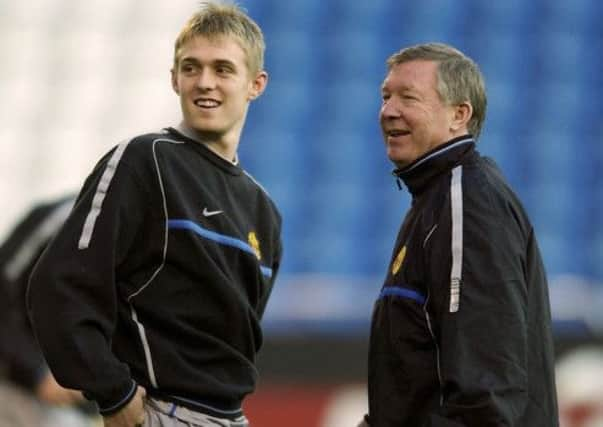Time catches up with child prodigy Darren Fletcher


They will tell you they know him, they will tell you how much they like him but they won’t speak on the record, won’t divulge anything too personal and would never countenance betraying the confidence of a man who has safeguarded his privacy and shunned the world of celebrity, craving only the chance to play football at as high a level as possible.
On Monday night he accepted that that level was no longer at the very top end of the English Premier League or even amongst the European elite. But ego was never going to prevent him from taking a step back to allow him to continue playing the game he had always been destined to thrive in.
Advertisement
Hide AdAdvertisement
Hide AdNot just because he was naturally gifted – and from a young age as he shone in the Tynecastle Boys ranks, amongst other top youngsters at Hutchison Vale and as he took on school pals at St David’s, Dalkeith – it was evident he was but because he worked as hard as anyone, earning the respect of his coaches and his peers.
No wonder many were cooing over the midfielder, describing West Bromwich Albion manager Tony Pulis one of the shrewdest deadline day operators thanks to his capture of the former Scotland captain. Little surprise either that so many of his former Manchester United colleagues were sorry to see him go. Rafael referred to him as ‘a legend’, ‘a friend’ and ‘a father’ and thanked him for everything he had done for him since he joined the club. It was a recurring theme. David de Gea said: “Thanks for your football, your support, for everything since I got here. Good luck with WBA!” Ander Herrera added: “Thanks for helping me so much from day one”, while Ashley Young described him as “one of the nicest guys in football.”
But Fletcher insisted he was no feeling overly emotional. Excited by the new chapter of his career, the 31-year-old, who had joined Manchester United at the age of 11 and made 342 appearances for the first team, winning every major trophy, said: “It feels great. This is a fantastic new challenge for me in my career. I’ve spent my career at Manchester United and it’s all I’ve ever known. But I felt it was the right time to move on and I’m not sentimental about doing that – I have great memories, obviously, but I’m now a West Bromwich Albion player and I cannot wait to get going.” It was the kind of respectful statement everyone who has every dealt with him would have expected.
After all this is one fo the few players who earned the respect of the infamously judgemental Roy Keane. No-one could forget the tirade of abuse the Irishman showered on the Scot in one particular game v Chelsea. He didn’t rant back, as always with Fletcher, he made his impact quietly but effectively, biting his tongue but then popping up with the only goal of the game to soothe the seething Keane. His professional approach is a mix of humility and steel, and was impressive enough for Keane to explore the possibility of exploiting his maternal lineage and lure him into the Republic of Ireland squad before Sir Alex Ferguson cut him off at the pass, always looking out for the laddie he had tempted away from the likes of Celtic and Rangers as a kid after receiving glowing reports from his scout Andy Perry.
Twenty years ago he asked the young Fletcher and his parents to trust him and he never betrayed that trust. That sense of honour was reflected in the way Fletcher went about his business, keeping his head down and proving himself the epitome of a team player. Even when he picked up a harsh red card that would keep him out of the 2009 Champions League final, he walked off the Emirates pitch, his head held high, a picture of polite dignity. A man his parents could be proud of.
That was the reason he was chosen to captain Scotland at such a young age, the reason he was chosen to wear the armband in the wake of Barry Ferguson’s transgressions. He was the perfect safe pair of hands, a man who could be relied on to lead by example and steer clear of controversy and one of the few whose appointment would not prompt dressing room disharmony. Because coaches love him but players do too.
They love his selflessness and his work ethic. They admire his endeavour and resilience, having not only come back from illness but also weathered tricky spells as some fans failed to recognise his worth in the early days at United and in the dark blue of Scotland. But he never gave less than his all. That is why Pulis is being lauded for what could be one of the most vital acquisitions of the January window, why the door will always be open for him to return to United in a coaching capacity and why people who have anything to say about him, have nothing but compliments to give.
FOLLOW US
SCOTSMAN TABLET AND MOBILE APPS